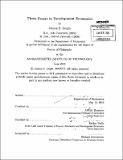Three essays in development economics
Author(s)
Leight, Jessica E. (Jessica Ellen)
DownloadFull printable version (7.555Mb)
Other Contributors
Massachusetts Institute of Technology. Department of Economics.
Advisor
Abhijit Banerjee and Esther Duflo.
Terms of use
Metadata
Show full item recordAbstract
This thesis seeks to analyze two questions central to the economic welfare of rural households in developing countries: the trade-offs between equity and efficiency induced by hybrid forms of property rights, and the decisions made by households in the process of human capital accumulation, particularly in early childhood. The first two chapters examine the impact of periodic land reallocations and tenancy reforms in China and India, respectively, on intravillage land inequality and the investment decisions made by rural households. The final chapter turns the focus to inequality within the household, analyzing how intrahousehold allocation of educational resources in rural China responds to inequities in endowment between children. In the first chapter, I evaluate the impact of village-level land reallocations in China on household economic outcomes. Since land was decollectivized in China in 1983, village leaders have implemented regular forced reallocations of land designed to enhance intravillage equity and attain other policy goals. I estimate the impact of insecure tenure using the past history of land shifts as an instrument for current tenure insecurity, and find that an increase in the probability of losing the current plot yields a decrease in agricultural inputs and production of around one standard deviation. Though the costs of insecure tenure are high, structural estimates of the varying cost of reallocation across different villages suggest the choice to reallocate does reflect an optimizing process on the part of village officials, who reallocate where the net benefit is larger. However, the observed pattern of reallocations would be optimal only given an objective function for the village leader that places an extremely high weight on equity, and even given this objective function, there is evidence that village leaders may be making some costly mistakes. In the second chapter, coauthored with Timothy Besley, Rohini Pande and Vijayendra Rao, we seek to analyze the long-run impact of land reform in southern India. Though land reform policies have been widely enacted across the developing world, evidence about the long-run impact of these policies remains quite limited. In this paper, we provide evidence about these long-run effects by combining the quasi-random assignment of linguistically similar areas to South Indian states that subsequently pursued different tenancy regulation policies with cross-caste variation in landownership. Roughly thirty years after the bulk of land reform occurred, land inequality is lower in more regulated areas, but the impact differs by caste group. Tenancy reforms increase own-cultivation among middle caste households, but render low caste households more likely to work as daily agricultural laborers. At the same time, an increase in agricultural wages is observed. These results are consistent with credit markets playing a central role in determining the long-run impact of land reform: tenancy regulations increased land sales to the relatively richer and more productive middle caste tenants but reduced land access for poorer low caste tenants. In the final chapter, I analyze the strategies employed by households in rural China to allocate educational expenditure to children of different initial endowments, examining whether parents use educational funding to reinforce or compensate for these differences. Empirical results obtained employing early-childhood climatic shocks as an instrument for endowment, measured as height-for-age, indicate that parental expenditure is preferentially directed to the relatively weaker child. In response to the mean difference in endowment between siblings, parents redirect between 10 and 20% of discretionary educational spending to the child with lower endowment, and this effect is robust across multiple measures of endowment and multiple measures of climatic shocks. This analysis is consistent with the hypothesis that parents use the intrahousehold allocation of resources to compensate for differences in endowment and thus in expected welfare, between their children.
Description
Thesis (Ph. D.)--Massachusetts Institute of Technology, Dept. of Economics, 2013. Cataloged from PDF version of thesis. Includes bibliographical references (p. 135-141).
Date issued
2013Department
Massachusetts Institute of Technology. Department of EconomicsPublisher
Massachusetts Institute of Technology
Keywords
Economics.